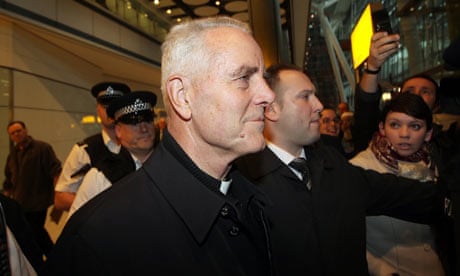Bishop Richard Williamson, whose readmission to the Catholic church caused an international outcry, last night apologised for remarks in which he denied the scale of the Nazi Holocaust.
In a statement on the website of the Rome Catholic news agency Zenit, he said his views on the Holocaust were not those of an historian. They had been "formed 20 years ago on the basis of evidence then available, and rarely expressed in public since." Williamson added: "To all souls that took honest scandal from what I said, before God I apologise."
He caused outrage by saying in a TV interview broadcast in January that there were no gas chambers in the Nazis' concentration camps. He also challenged the widely accepted figure of six million victims, saying he believed that no more than 300,000 Jews had died.
"I can truthfully say I regret having made such remarks, and that if I had known beforehand the full harm and hurt to which they would give rise, especially to the Church, but also to survivors and relatives of victims of injustice under the Third Reich, I would not have made them," Williamson said.
Some Jewish groups expressed disappointment at his statement. Rabbi Marvin Hier, founder and dean of the Simon Wiesenthal Center in Los Angeles, said it was "not the kind of an apology that would end this matter" because it failed to address the central issue.
"The one thing he doesn't say, and the main thing, is that the Holocaust occurred, that it is not a fabrication, that it is not a lie," Hier said in a telephone interview. "You want to make an apology, you have to affirm the Holocaust."
Renzo Gattegna, the president of Italy's Jewish Communities, described the apology as "absolutely ambiguous."
The bishop belongs to an ultra-conservative Catholic breakaway movement, the Society of St. Pius X (SSPX), and was expelled from the church after being ordained in an unauthorised ceremony in 1988. Last month Pope Benedict lifted his excommunication and those of three other SSPX bishops as a first step towards healing the church's only contemporary schism.
The move caused fury among Jewish leaders and indeed many Catholics, especially in Germany and Austria. It has led to widespread questioning within the church of Benedict's judgment and the way he reaches his decisions.
Zenit said Williamson's comments were released by the Vatican's Ecclesia Dei commission, a body set up by the late Pope John Paul II to try to heal the rift with the SSPX, which broke with the church over liberal reforms enacted in the 1960s.
In a passage hinting at pressure brought to bear on him, the bishop said "the events of recent weeks and the advice of senior members of the SSPX have persuaded me of my responsibility for much distress caused".
